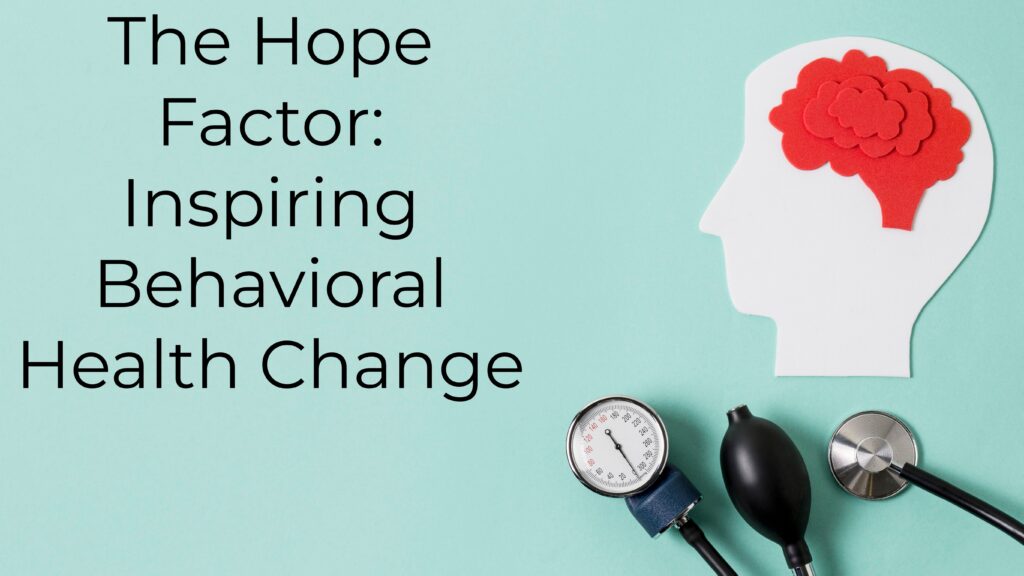Introduction
The hope factor: Inspiring behavioral health change and propel major positive change in the field of mental health. The power of hope, which is sometimes disregarded, can change people’s lives by giving them the willpower to face their obstacles and come out on top.
Highlighting the value of hope in behavioral health, its cultivation, and its function in promoting recovery are the goals of this blog post.

Table of Contents
The Significance of Hope in Behavioral Health

Hope plays a significant role in mental health care outcomes and is more than just a transient feeling. Maintaining optimism has been linked to better mental health, following treatment programs, and achieving long-term recovery objectives, according to several studies.
Hope is a motivator that pushes people to imagine a better future and take concrete steps to make it a reality.
Fostering Hope in Individuals with Mental Health Challenges
Acknowledging hope’s significance in the healing process is the first step towards fostering it. Professionals in mental health can be extremely important by:
- Creating attainable objectives that enable people to take charge of their rehabilitation.
- Offering constant support and constructive criticism.
- To increase motivation and morale, emphasize accomplishments, even modest ones.
It’s critical to provide a setting where people feel understood and encouraged so that hope can develop organically.

The Role of Support Systems
Hope is nourished by support networks, which include friends, family, and medical experts. These networks offer the psychological support required to keep hope alive in trying times.
Consistent communication, compassion, and an unbiased listening ear can significantly impact a situation.
Real-life Success Stories
Strong reminders of the power of hope are provided by real-world examples. Evaluate Jane’s experience, who endured years of intense anxiety. She gained good symptom management skills by using a hope-centered approach with the help of her peer group and therapist.
Jane shares her story to encourage others and now campaigns for mental health awareness.

Maintaining Hope During Difficult Times
Keeping hope is possible, even in the worst of times. Here are a few useful pointers:
- Develop an attitude of thankfulness by praising even the little things in your life.
- Practice meditation or mindfulness to help you center yourself and lessen anxiety.
- To foster a sense of advancement and success, set reasonable and attainable goals.
- Remain in touch with communities and support networks that are aware of your path.
Community Support and Advocacy
Encouraging optimism for everyone confronting mental health difficulties requires community efforts and advocacy work.
Communities may foster a more welcoming atmosphere that motivates people to ask for assistance and hold onto hope by increasing awareness and lowering stigma.

FAQs
Q: How can I help a loved one maintain hope in the face of mental health challenges?
A: Active listening and validating a loved one’s experiences are the first steps in providing support. Urge them to make sensible plans and recognize all of their accomplishments, no matter how little.
Their sense of hope can also be greatly increased by offering them regular encouragement, sympathetic contact, and assistance in connecting with support groups.
Q: What role do mental health professionals play in fostering hope?
A: Therapists who specialize in mental health play a critical role in treating patients with hope. They can assist patients in identifying their potential for progress and recovery, help them create realistic objectives, and offer helpful criticism.
Their proficiency in developing individualized therapy programs can assist people in discovering avenues for hope.
Q: Are there specific techniques to cultivate hope in oneself?
A: Setting attainable objectives, keeping a gratitude notebook, practicing mindfulness, and participating in gratitude exercises are all effective ways to cultivate optimism. Creating a community with like-minded people and strengthening one’s support system can also contribute to a positive perspective.
Q: Can maintaining hope improve treatment outcomes?
A: Definitely. Hope can improve motivation and involvement in therapy, which can have a substantial impact on treatment outcomes. Hopeful people have a higher likelihood of recovering because they are more resilient, open to trying out novel coping mechanisms and dedicated to following their treatment regimens.
Q: Is it possible to maintain hope during relapses or setbacks?
A: Keeping hope amidst obstacles can be achieved by keeping an eye on the greater picture, while difficult. Reflect on your prior achievements and use failures as teaching opportunities. Maintaining open lines of communication with experts and support systems can also offer the inspiration required to keep going.
Conclusion
It takes more than just optimistic thinking to inspire hope in behavioral health; it also involves building a network of support and practical steps toward a better future.
Stressing hope can cause amazing changes in the lives of advocates, mental health professionals, and individuals on their path to mental wellness.
Get in touch with your neighborhood support groups or mental health organizations if you’d like more information on how hope-based interventions might help or if you’d like to become active in community advocacy.
We can cultivate a culture of healing and optimism together.

Pingback: Hall Country Health Department: A Community Wellness Pillar -